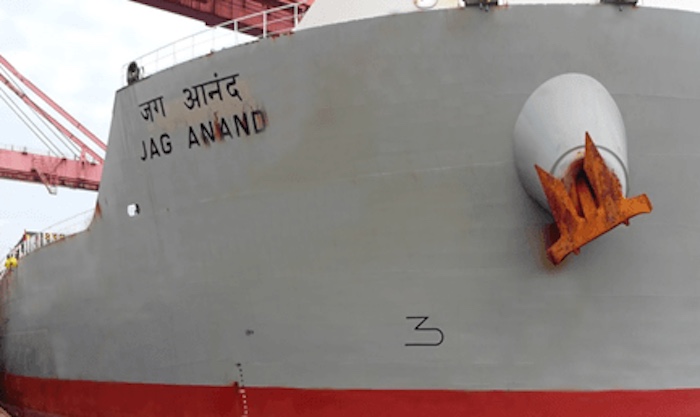China urged to let stranded crew leave

The International Transport Workers’ Federation (ITF) is urging the governments of China, India and Australia to collaborate and urgently end the stalemate around the berthing of a pair of coal-carrying vessels in Chinese ports, as some of the seafarers have been onboard over 20 months. The International Maritime Organization (IMO) is also using diplomatic channels to try and fix the situation.
It would be like an innocent delivery person being caught in a fight between two neighbours
The Jag Anand and the Anastasia have been unable to dock since June and August this year, respectively.
Splash has reported repeatedly in recent months of a swathe of ships carrying Australian cargoes struggling to offload shipments in China as ties between Canberra and Beijing have deteriorated this year.
Abdulgani Serang, general secretary of the National Union of Seafarers of India, the ITF Seafarers’ Section Committee Asia-Pacific vice chair and an ITF executive board member, commented: “We have at hand a humanitarian crisis on board where the entire crew is fatigued and requires urgent relief. They are mentally and physically exhausted due to their prolonged time on board. It would be very concerning if the reason that the Chinese authorities are refusing the ships from docking is that it has a cargo of coal from Australia. It would be like an innocent delivery person being caught in a fight between two neighbours.”
The shipowner is trying their best to have the ship cargo discharged and has offered to charter a flight to do the crew change. The Indian government is also trying to help salvage the situation and get the crew home, but the stalemate continues.
The ITF has suggested that if crew change is not possible, then at least the cargo could be discharged so the ship can move on and sign off the crew at the next convenient port. There are even offers from neighbouring countries to buy the coal and help resolve the situation.
ITF Seafarers’ and Inland Navigation section coordinator, Fabrizio Barcellona, said the plight of the 23 seafarers onboard the Jag Anand and the 18 on the Anastasia has shown how important it was for governments to take action on the crew change crisis before extreme situations like this developed.
“The fact is that the crew of the Jag Anand were already 15 months on board when they picked up this coal from Australia. The international maximum is 11 months at sea. The Australian authorities should not have allowed the vessels to sail without getting these seafarers home and replacement crew on board,” said Barcellona.
Australia’s trade minister Simon Birmingham said last week that Australian authorities had contacted their Chinese counterparts to try and resolve the situation.
“It is unacceptable for such uncertainty to exist over such a long period of time that effectively leaves sailors stranded at sea,” he said.
There are many other bulk carriers waiting with Australian cargoes off the Chinese coastline. Canberra and Beijing have seen relations sour significantly this year with Australia leading the charge to investigate the origins of coronavirus. China has slapped bans on a host of Australian products in response.

At the Jingtang anchorage only, about 22 vessels have been stuck since early June 2020 and are unable to unload. We cannot even dream of changing crews with the Chinese bureaucracy. Most of the ships have a crew on board for about a year and more. We only hear promises and press releases, but the government’s attitude towards us as bio-robots !!!
If the shipping vessels belongs to their respective countries, then the countries should call back the shipping vessels at home and do crew change by airlifting them. What is more important is getting the cargo, shipping vessels and crew members back home rather than waiting in hope that the these Chinese will offload the materials. The straight forward reason is Chinese Industries are going through DOWN phase, the goods which they produce is not going to be purchased internationally looking at the greedy strategy of grabbing natural resources of other countries by land grabbing and self centric FRÏENDŞHIP nature of China. When their industries are DOWN they don’t need these materials as they only show to the world they are strong, BiG and generous economy just to make other countries fear of them which in real they are hallow inside.
Seafarers in this situation just pressure tools in the Chinese hands!!!
Dear seafarers, sailing is not fun anymore. Think twice before you sign your COE.